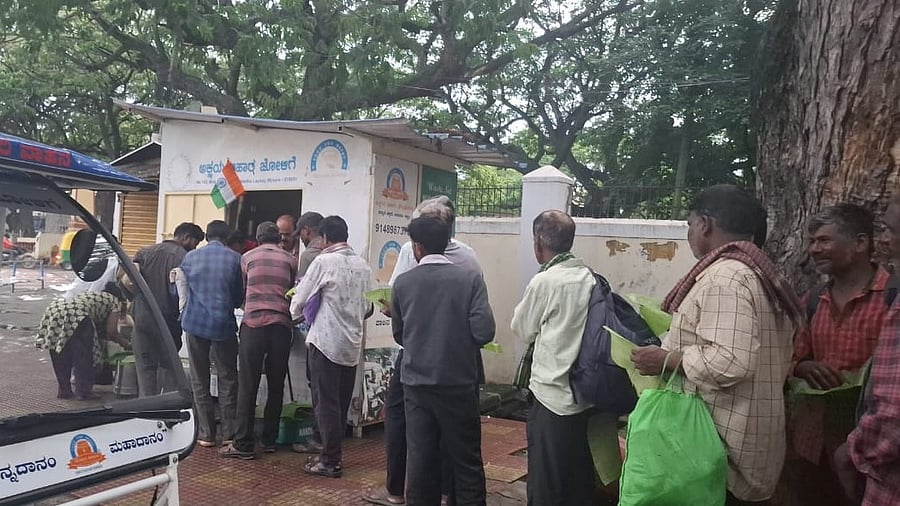
People queue up for food at an NGO’s distribution centre in Mysuru.
Credit: DH Photo.
Mysuru: Even as World Food Day was observed on Thursday, experts say food waste in Karnataka remains alarmingly high — and many people still go hungry due to lack of basic identification documents needed to access government benefits.
According to Karnataka State Food Commission (KSFC) Chairperson Dr. H. Krishna, at least 300 tonnes of cooked food go waste daily in Bengaluru, mostly from hotels and functions. In Mysuru alone, about 300 kg of food remains unused every day across 200 hotels, restaurants, and 400 street food vendors, said Mysore Hotel Owners’ Association President C. Narayangowda.
Experts have urged the government to streamline the process of collecting safe, leftover food from hotels and functions and distribute it to those in need.
They also called for a dedicated survey to identify people who lack basic documents such as Aadhaar cards, ration cards, or caste certificates. “Those without documents — including people on the streets, near bus stands, railway stations, government hospitals, and in slums — are being left out of welfare schemes like Anna Bhagya and the guarantee schemes,” said an expert. “A proper survey is essential to ensure they get access to food, water, and shelter.”
Food Commission Chairperson Krishna said the Commission would submit recommendations to the government on both issues.
H.R. Rajendra, who runs the NGO Akshaya Ahara Jolige in Mysuru, said his team collects around 300 kg of leftover food daily, enough to feed about 500 people — though demand is at least six times higher. “During the wedding season, we collect food from choultries sufficient to feed 3,000 to 10,000 people. We have four vehicles and five distribution centres near K.R. Hospital, Srirampura, J.P. Nagar, Siddarthanagar, and Kuvempunagar. But each day, we return disappointed, unable to reach everyone in need,” he said.
Many of those who depend on these meals are attendants of patients at K.R. Hospital or residents of slums who lack ration cards and other documents. “The government should convene a meeting with NGOs and volunteers to create a proper mechanism for collecting and distributing surplus food. Indira Canteens don’t cover all areas,” Rajendra added.
Hotel association chief Narayangowda said that food waste in A-grade and star hotels is minimal as they cook mostly on order. “People are becoming more conscious now, but they should only order what they can consume,” he said.
Assistant Executive Engineer (Environment), MCC, K.S. Mruthyunjaya, noted that some discarded food is collected by individuals and supplied to piggeries.
Dr. S.L. Ravindra of the Food Safety and Standards Authority of India (FSSAI) said donors should ensure that leftover food is distributed within three to four hours of preparation.
Dr. Krishna of the Food Commission added, “The National Food Security Act, 2013 guarantees food for all. Any NGO that can care for at least 25 people is eligible for an aid of ₹12 lakh to start a shelter. Wasting food is an insult to the farmer and a denial of another person’s right to eat.